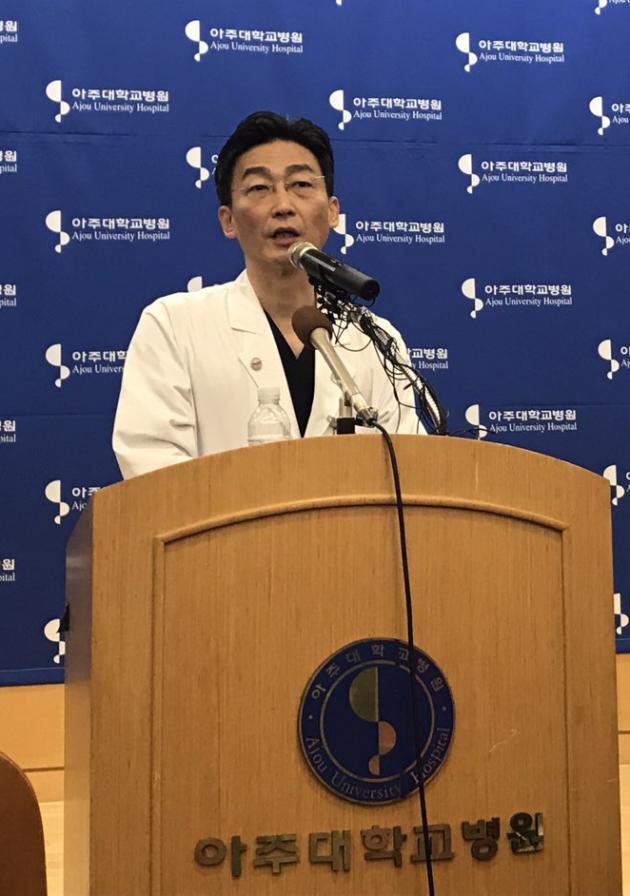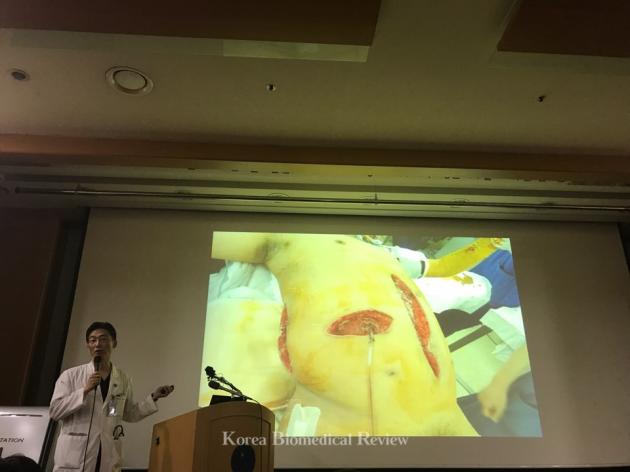What started out as a press briefing on the North Korean defector took a 180-degree turn as his attending physician, Lee Cook-jong, aired his grievances to reporters Wednesday morning at Ajou University Hospital.
“To be honest, there will be little (talk) about the patient (today),” Lee said at a briefing that lasted three hours and 15 minutes to confront a politician’s accusations levied against him Wednesday and controversy surrounding a previous patient.
Rep. Kim Jong-dae of splinter opposition Justice Party Wednesday claimed the doctor committed an “act of terror” on the defected soldier’s character with the release of the patient’s condition.

Kim posted on his social media platform: “The soldier, while on the verge of death, suffered an act of terror on his character with the publicizing of the parasites, fecal matter, and corn found in his body during treatment.” The comments targeted Lee, who attained a celebrity status for taking care of the North Korean defector.
Lee had also previously gained widespread media attention for his treatment of a sea captain almost killed by Somali pirates in 2011. Back then, the trauma specialist was accused of putting on “a fantastic show” while saving the captain, shot six times by Somali pirates after he tried to rescue a seized chemical freighter near the Gulf of Aden.
Kim’s remarks put Lee back into a political battlefield, where the doctor had previously faced accusations of pandering to the media to gain publicity.
On Wednesday, Lee apologized to reporters for rehashing the Somali case, which happened seven years ago, saying, “If I do not speak of this today, then I will not have another opportunity to do so. I am doing so out of necessity to (stop) controversy and accusations.”
Lee said he did not reveal anything about the captain’s condition during treatment because the government asked him to remain silent. Lee left his phone behind on purpose but was greeted by reporters on the ground regardless.
Even then, the Korean government did not support him well: they borrowed a Swiss helicopter. He couldn’t have done it without the American Navy, Lee said.
Despite it all, Lee kept quiet – a decision that later put him in an unfavorable light, he said. He was cast as a doctor who publicized patient treatment for personal gain, and some did not even believe the ship captain was a trauma patient, with an injury severity score (ISS) of only eight, Lee said.
Lee cleared the air Wednesday by showing for the first time pictures of the ship captain in 2011. The patient had, in fact, an ISS score of 15, which qualifies him as a trauma patient, the doctor said.

“I suffered for seven years when I did not speak up about the (surgery of the) ship captain,” Lee said.
The treatment of the North Korean soldier, too, threw him into a spotlight he did not want. Lee still uses a Blackberry and does not have the time to use social media, he said.
“This is not my first time treating a North Korean patient. Treating patients is not a (remarkable) event. I am paid a salary, and I am working a difficult job,” Lee said.
Ajou University Hospital’s trauma center has 150 trauma patients and is severely understaffed, he added.
Lee also lashed back at the accusation of committing an “act of terror” by releasing treatment details, saying he only did so as a safety precaution and to protect himself from facing the same criticisms he did with the Somali case.
“If I did not show (the pictures of the parasites), what do you think would have happened if his intestines ruptured?” Lee asked. “Even textbooks outline that parasites can break through the intestines. This patient had hepatitis, (fecal) contamination, all of it. He didn’t even have a pulse. He was hemodynamically unstable.”
He clarified the defector had far worse conditions than the parasites, such as hepatitis B that can progress to hepatic cirrhosis or liver cancer, that he did not disclose during the first briefing. Lee also noted that the hospital follows a strict protocol for gaining the patient’s informed consent.
Through his complaints, Lee revealed a trauma center in Korea that lacks proper support. The hospital is short-staffed, especially with trauma surgeons, and that has led him to work day and night in hour-long surgeries. He had to operate on a patient who was possibly AIDS-positive while suffering an open wound from a helicopter ride. He didn’t have the time or the financial means to run an AIDS-test, Lee said.
“In Korea, trauma centers are not sustainable,” Lee said. “(What I expect from life in South Korea is) for those injured to be able to get the proper treatment through either helicopter or ambulance within 30 minutes, or at least in an hour.”
Related articles
- N. Korean defector has hepatitis B, inactive tuberculosis
- Seoul considers supplying antiparasitic drugs to N. Korea
- N. Korean defector ‘dust off’ by US Army’s air medics
- Defector provides glimpse into N. Korean soldiers’ lives
- Parasites make treatment of N. Korean defector harder, doctor says
- N. Korean soldier, shot while crossing border, in ‘critical’ condition
- Doctor Lee’s struggle shows downside of medical service in Korea

